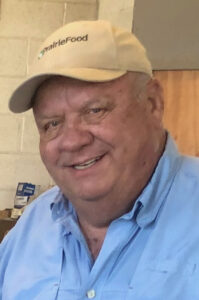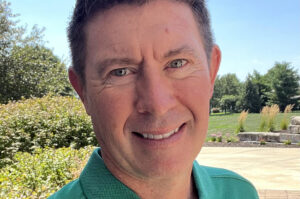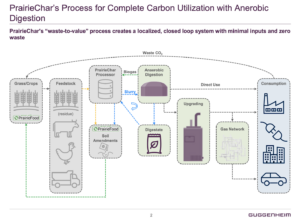Startland News’ Startup Road Trip series explores innovative and uncommon ideas finding success in rural America and Midwestern startup hubs outside the Kansas City metro.
LAWRENCE — Entrepreneurship is all about networking, Robert Herrington said.
“You never know where a pivot or direction is going to come from,” said Herrington, an early member of the Pipeline network, as well as the co-founder and chairman of the board for PrairieFood. “One thing I learned early on about the business world from my dad was to surround yourself with people who know a hell of a lot more than you do. Input coming from different venues sheds a light on new opportunities.”
The Lawrence-based biotechnology company is a game-changer in sustainable farming, Herrington noted. PrairieFood offers a micro-carbon soil amendment derived from readily available biomass waste sources. PrairieFood’s patented micro-carbon process prioritizes soil health and water retention, which in turn helps farmers grow crops while reducing synthetic inputs and increasing revenue.
“It takes 300 million years to naturally cycle a carbon — we break down that carbon in one second,” Herrington said. “No one’s done that before. Previous technology takes anywhere from two-to-24 hours to break down the carbon. We’ve done what no one else in the world is doing.”
Click here to check out PrairieFood.
Value of connections
The idea behind PrairieFood’s micro-carbon process was inspired by one of Herrington’s high school classmates from Colby, Kansas, he recalled.

Photo by Gabriel Jimenez
“We really started working with carbon about 13 years ago,” Herrington said. “We would take waste material and make carbon-neutral coal out of it. … The problem we ran into was that it cost us so much to make it that we had to charge $100 a ton, and electric power plants were only paying $17 a ton for coal.
“One of my classmates from Colby, David Brenn, told farmers what to put on their ground to grow their crops,” Herrington continued. “He asked me what was in our coal, so I got the analysis and sent it over to him. He goes, ‘Why the hell would you want to burn this? You need to put this in the ground; this is what the soil needs to increase its soil health.’ That was the moment we pivoted the company. Ever since, we’ve been focused on agriculture, soil health, nutrition and being environmentally prudent.”
Tapping into his network once again, Herrington announced early this summer that serial agricultural entrepreneur Jason Tatge had stepped into the role of CEO of PrairieFood. The duo first met in 2008 through Pipeline — a network and fellowship of high-performing entrepreneurs based in the Midwest. Tatge was part of Pipeline Entrepreneurs’ 2008 cohort and Herrington served as a mentor.
“I have several folks from Pipeline who are part of my business today,” Herrington noted. “Bringing Jason on was a dream of mine. I’ve been recruiting him for three years now.”
“My whole career has been either in working with farmers or working with the mills that buy the product from the farmer or exporting the products altogether,” Tatge said. “I’ve known Rob for quite a while now, and between the team that he put together and the customers they were serving, it got me really excited about being a part of this.”
Tatge also serves as the board chair for Pipeline, he said, noting that it is one of the most unique and tight-knit programs he has ever been involved in.
“It’s been over 14 years since I went through the program, but I am still discussing things with other alumni all the time,” Tatge shared. “Not all connections through Pipeline may be a formal business relationship, but people are making investments, giving and receiving advice on employee or legal challenges and just having that support. That trusted network is really the huge value of what Pipeline does.”
Global potential
PrairieFood’s first prototype plant is based in Pratt, Kansas, but the company has plans to expand globally, the duo said.
“We’re benefiting the farmers and the rural communities; the environment; and providing more nutritious food for all of the population of the globe,” Herrington noted. “By bringing those together in a way that is economically viable, we have a global opportunity to grow this process, this mission and this methodology. The process we’ve developed can lead to a circular economy where there’s more cash flow in rural America.”
“I don’t think there’s been a rural economic development opportunity like this since ethanol — and that was 20 years ago,” Tatge said. “There’s not a lot of things that stimulate the rural economy like agriculture and this waste-to-nutrients package is able to do so. And, there’s waste products everywhere, so this is a really exciting way to help cycle that.”
This story is made possible by Entrepreneurial Growth Ventures.
![]() Entrepreneurial Growth Ventures (EGV) is a business unit of NetWork Kansas supporting innovative, high-growth entrepreneurs in the State of Kansas. NetWork Kansas promotes an entrepreneurial environment by connecting entrepreneurs and small business owners with the expertise, education and economic resources they need to succeed.
Entrepreneurial Growth Ventures (EGV) is a business unit of NetWork Kansas supporting innovative, high-growth entrepreneurs in the State of Kansas. NetWork Kansas promotes an entrepreneurial environment by connecting entrepreneurs and small business owners with the expertise, education and economic resources they need to succeed.









































